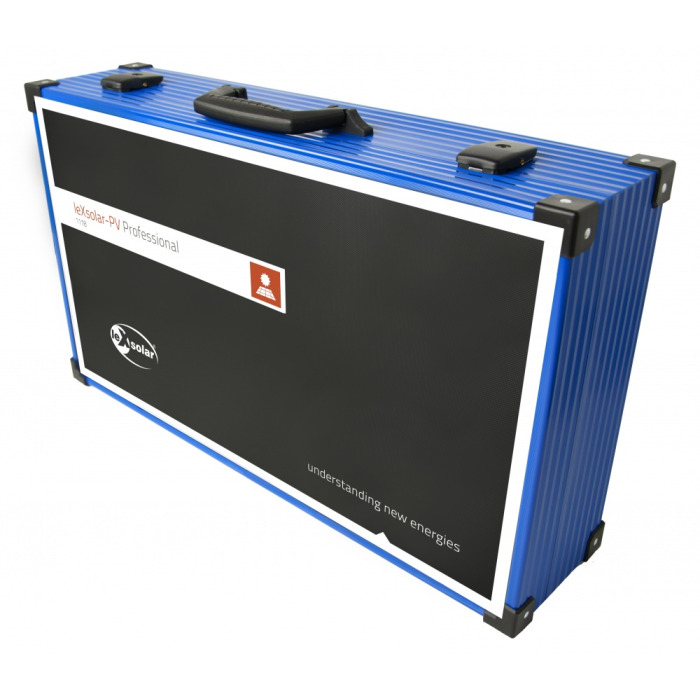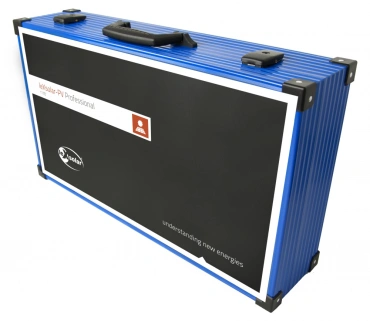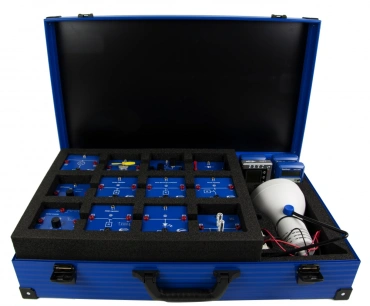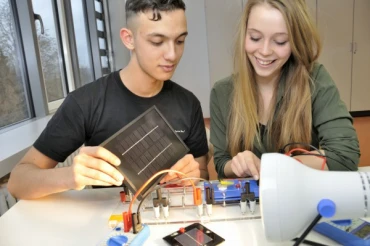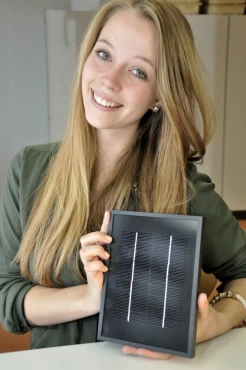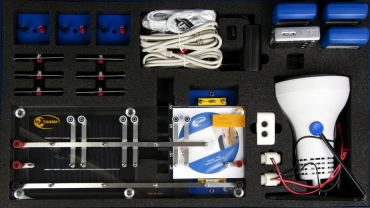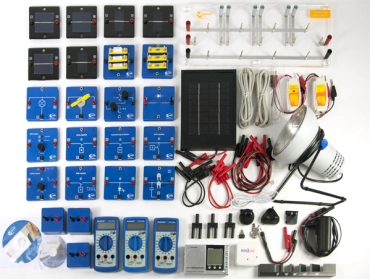leXsolar-PV Professional
Nowadays, a comprehensive understanding of photovoltaics is necessary for a variety of professions in the fields of renewable energies. For the relevant studies and courses of education, leXsolar-PV Professional offers the optimal tools for practical courses. The spectrum of experiments reaches from the physical fundamentals of photovoltaics, to the analysis of the components of PV-Systems, up to the design of complex PV-Systems on a laboratory scale. The experiments are designed to be equally employed for training of sales representatives, for apprenticeship, in-service training of technicians and PV-installers, as well as for basic education of engineers.
Key data
- Photovoltaics-training system for technical training
- Basics of photovoltaics
- Experiments with components of PV-systems
- Setup of fully equipped PV-systems in laboratory scale
Electrical engineering – basic experiments
- Measurement of voltage, current, and power
- Ohm’s law
- Series connection of resistors (voltage divider)
- Parallel connection of resistors (current divider)
Photovoltaic – basic experiments
- Series and parallel connection of solar cells
- Power dependence on the surface area of the solar cell
- Power dependence on the angle of incidence
- Power dependence on level of illumination
- Power dependence on level of illumination under load
- Internal resistance dependence on level of illumination
- Shading effect on solar cells
- Dark characteristic curve of solar cells
- I-V-characteristics, MPP and fill factor of solar cells
- Dependence of the I-V-characteristics of solar cells on level of illumination
- Dependence of the I-V-characteristics of solar cells on temperature
- Characteristic curve of solar modules
- I-V-characteristics of partly shaded solar modules
- Temperature coefficient of solar cells
Photovoltaic system experiments
- Components of an off-grid system
- Possible operating conditions of off-grid systems
- Working principle of shunt and series regulators
- Comparison of PWM- and series regulator
- Load characteristic of PWM regulators
- Working principle of a MPP tracker
- Characteristics of a MPP tracker
- Working principle of deep discharge protection
- Working principle of an inverter
- Determination of the output voltage progression at an inverter
Components
- 1400-13 Base unit Professional
- 3× 1100-01 Solar panel 0.5 V, 420 mA, QC
- 3× 1100-02 Solar panel 0.5 V, 840 mA, QC
- 1100-04 Solar panel 4.5 V, 840 mA, 3.5 Wp
- L2-01-023 Stand for solar panel
- L2-04-022 Lamp for solar panel
- 1118-05 leXsolar-diode module Pro
- 1118-04 leXsolar-potentiometer module Pro
- 1118-02 leXsolar-motor module Pro
- 1118-08 leXsolar-LED module (high brightness) Pro
- 1118-01 leXsolar-light bulb module Pro
- 1118-06 leXsolar-shunt regulator module Pro
- 1118-10 leXsolar-series regulator module Pro
- 1118-07 leXsolar-deep discharge protection module Pro
- 1118-13 leXsolar-MPP tracker module Pro
- 1118-15 leXsolar-PWM regulator Pro
- 1118-12 leXsolar-DC/ AC inverter module Pro
- 1118-11 leXsolar-capacitor module Pro
- 1116-04 leXsolar-radio module
- 2× 1800-01 Resistor module (triple) Pro
- 1800-06 Resistor plug element 33 Ohm
- 3× 1800-04 Resistor plug element 100 Ohm
- 2× 1800-05 Resistor plug element 10 Ohm
- 2105-00 Power supply
- 3× 1100-20 leXsolar-lightning module Pro
- Aluminum case with foam inserts
- 3× L2-06-011 Digital multimeter
- L3-03-081 leXsolar-DVD Professional
- 2× L2-04-066 Safety test lead, red, 25 cm
- 2× L2-04-067 Safety lest lead, black, 25 cm
- 2× L2-04-059 Safety test lead, red, 50 cm
- 2× L2-04-060 Safety test lead, black, 50 cm
- 3× L2-05-068 Safety short-circuit plug, with middle socket
Age: from 16 years
- Subject
- Photovoltaics
- Quantitative unit
- ks
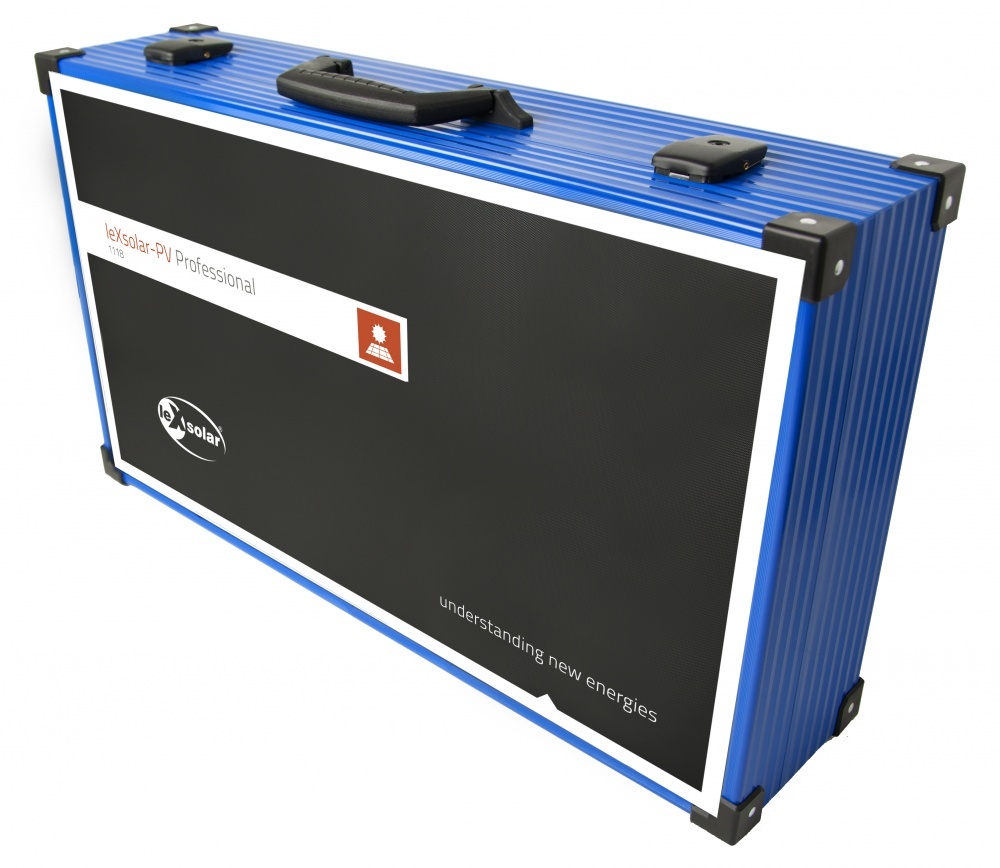
leXsolar-PV Professional
